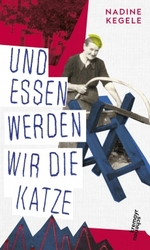- Das Haus
- Newsletter
- Service
- Publikationen
- Veranstaltungen
- NEU Livestream
- Ausstellungen
- Buchmagazin & AutorInnen
- AutorInnen
- AUFTRITTE
- Rezensionen Buch
- Rezensionen 2019
- Rezensionen 2018
- Rezensionen 2017
- Rezensionen 2016
- Rezensionen 2015
- Rezensionen 2014
- Rezensionen 2013
- Pressespiegel 2000-2010
- AutorInnen A
- AutorInnen B
- AutorInnen C
- AutorInnen D
- Autorinnen E
- AutorInnen F
- AutorInnen G
- AutorInnen H
- AutorInnen I
- AutorInnen J
- AutorInnen K
- AutorInnen L
- AutorInnen M
- AutorInnen N
- AutorInnen O
- AutorInnen P
- AutorInnen Q
- AutorInnen R
- AutorInnen S
- AutorInnen T
- AutorInnen U
- AutorInnen V
- AutorInnen W
- AutorInnen Z
- Incentives
- Rezensionen Sachbuch
- Verlage
- Dank an Verlage
- Impressum
- Bibliothek & Sammlungen
- Katalogsuche
- Partnerinstitutionen





FÖRDERGEBER
PARTNER/INNEN

 Nadine Kegele: Und essen werden wir die Katze. We'll Eat the Cat. In Und essen werden wir die Katze (We'll Eat the Cat), Nadine Kegele keenly traces what makes humans human. The writer devotes a combination of short stories, textual/visual collages, and illustrations to narrating diverse characters' lives. The writings revolve around themes of home and homeland and demonstrate how literature can ask questions of identity. The portraits pull off a tricky tightrope act, balancing lived reality against literary realism. In "Albin," Kegele tells the story of the eponymous construction worker as he struggles with his lot in life and observes the restrictions placed on it. Why? Because he is a construction worker who, apparently, only has either women or workplace accidents on his mind. But Albin is interested in birds and art. He grows vegetables, likes to read and think about more than just work. He is not synonymous with his job. Even if people don't take his word for it. Each story takes its own form. In "Schmetterling und Holz" (Butterfly and Wood), for example, we follow two parallel first-person life stories. A horizontal red line passes through the middle of the page. On the top, we read about an Afghan woman who has been married since age fifteen; the bottom half is in the voice of an unmarried male refugee. They are linked by their journeys to escape violence and death, and by the insight that in the West, freedoms must also be fought – or paid – for. In the piece "Syrien ist heimlich in Polen verliebt," (Syria Has a Secret Crush on Poland), we get a glimpse of the daily life of a woman who teaches German to refugee children. The students have names like Armenia, Afghanistan, Syria, Kurdistan, Ukraine, Turkey, Poland, and Egypt. But they are not mere children. Not only have their journeys to safety aged them mentally – life in Austria has forced them to take on responsibility, and not only for themselves. They oscillate between two worlds: their countries of birth and Austria. Will they find a new home? Nadine Kegele proves to be an attentive listener and a magnificent storyteller. Und essen werden wir die Katze succeeds at presenting characters from many cultural and social backgrounds, beyond their differences, as human beings. All of them are united by the same worries, hopes, and longings: Can I live the life I choose? May I love according to my desire? May I speak my mind? Abridged version of the review by Erkan Osmanovic, February 4, 2019.
|
| Veranstaltungen |
|
Junge LiteraturhausWerkstatt - online
Mi, 13.01.2021, 18.00–20.00 Uhr online-Schreibwerkstatt für 14- bis 20-Jährige Du schreibst und...
Grenzenlos? (Literaturedition Niederösterreich, 2020) - online
Do, 14.01.2021, 19.00 Uhr Buchpräsentation mit Lesungen Die Veranstaltung kann über den Live... |
| Ausstellung |
|
Claudia Bitter – Die Sprache der Dinge
14.09.2020 bis 25.02.2021 Seit rund 15 Jahren ist die Autorin Claudia Bitter auch bildnerisch... |
| Tipp |
|
LITERATUR FINDET STATT
Eigentlich hätte der jährlich erscheinende Katalog "DIE LITERATUR der österreichischen Kunst-,... |
|
OUT NOW flugschrift Nr. 33 von GERHARD RĂśHM
Die neue Ausgabe der flugschrift des in Wien geborenen Schriftstellers, Komponisten und bildenden... |